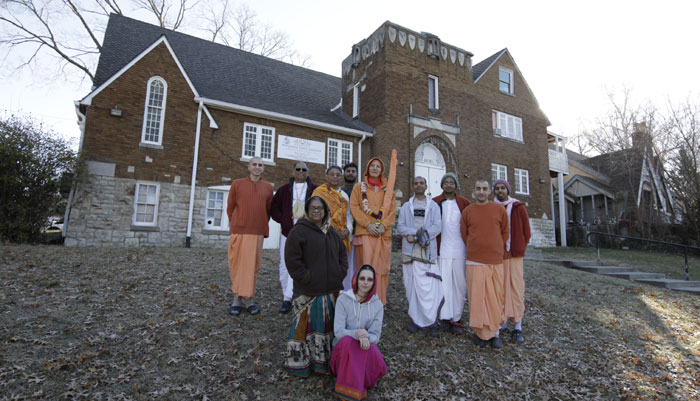 “The community at RVC not only helped me nurture my budding knowledge of Vedic knowledge, but also welcomed me with open arms, showing by example and without judgement that we are all valuable individual souls. Once I became a part of this completely unique community, I constantly wanted to be there.
“The community at RVC not only helped me nurture my budding knowledge of Vedic knowledge, but also welcomed me with open arms, showing by example and without judgement that we are all valuable individual souls. Once I became a part of this completely unique community, I constantly wanted to be there.
Graham Murphy- Environmental Engineer Student at Loyola University of New Orleans
RVC’s MISSION
Rupanuga Vedic College is a seminary branch of the International Society for Krishna Consciousness (ISKCON) in Kansas City, MO.
Those who are interested in the science of self-realization will appreciate RVC as one of the few places to obtain it in the USA. RVC’s vision of a college, derived from A.C. Bhaktivedanta Swami (Srila Prabhupada), concentrates on delivering spiritual knowledge from the Vedic experts along with training on how to apply such knowledge practically in life and subsequently change the world.
Srila Prabhupada comments, “Modern civilization has advanced considerably in the field of mass education, but the result is that people are more unhappy than ever before because of the stress placed on material advancement to the exclusion of the most important part of life, the spiritual aspect..Thus, the aim of real education should be self-realization, realization of the spiritual values of the soul.”
By this spiritual education one will experience new heights in his or her own overall quality of well-being. Not just the individual receiving this education will experience the benefits, but the whole world will experience more peace, happiness, and virtue.

THE MEANING OF RVC
Rupanuga refers to being followers of Srila Rupa Goswami, a renowned saint and scholar from India (1489-1564). Rupa Goswami is considered an eternally self-realized person. He was an erudite scholar who studied Sanskrit, Arabic and Persian, and he wrote a large number of important books on the science of bhakti-yoga.
Vedic refers to the ancient system of knowledge and the culture of devotion described in the Vedas, which has the most comprehensive knowledge about all subjects of life. Veda in Sanskrit translates to “knowledge.”
CERTIFICATION
- The Rupanuga Vedic College was founded as Rupanuga Para Vidyapitha in 1962 (Vrndavana, India). Later it was inaugurated in the United States on September 29, 1996, as the collegiate division of the International Society for Krishna Consciousness (ISKCON) KrishnaFest Incorporated.
- RVC is a division of ISKCON KrishnaFest Inc. which is incorporated with The United States of America Department of Treasury as a tax-exempt 501 (c) (3) Not-for-profit religious entity. (Federal Tax ID # 59 3036972).
- RVC is registered in the state of Missouri to grant theological degrees in the field of Vaisnava Philosophy, Vaisnava Education, Vedic History, etc.
- RVC is a theological college which was exempted by the Missouri Coordinating Board for Higher Education in 1998.
- RVC is not accredited.
VISION FOR A VEDIC COLLEGE
A. C. Bhaktivedanta Swami Prabhupada often expressed his thoughts;
“We are traveling all over the world, but there is no university, no institution, no school, no college where the education of spiritual nature is imparted.”
Here are his perspectives for the college which we strive to meet:
- The college should be state-approved to award Bachelors, Masters and Doctorates of Divinity degrees according to the advancement of knowledge.
- “Example is better than precept.” Instructors must be learned and practicing Vaisnava teachers.
- Sincere students coming from anywhere in the world should be admitted for education without financial obligation and should imbibe the ideals of the college namely: peacefulness, self-control, austerity, purity, tolerance, honesty, knowledge, wisdom and religiousness.
- The basis of the curriculum shall be Vaisnava texts taken from the Vedic body of literature including: Vedanta Sutra, Upanisads, Ramayan, Mahabarata, Srimad Bhagavatam, Sri Caitanya Caritamrta, Bhakti-rasamrta Sindhu, etc.
- The initial emphasis should be to train first class brahmanas (intellectuals), then ksatriyas (administrators), and vaisyas (agriculturalists and businessmen).
- Devotional titles should also be awarded to students who pass examinations. The titles should be Bhakti-sastri (proficient in primary Vedic scriptural knowledge), Bhakti-vaibhava (accomplished in Vedic scriptural knowledge), Bhakti-vedanta (master of Vedic scriptural knowledge) and Bhakti-sarvabhauma (professor of Vedic knowledge).
- The primary language medium should be English, and the Sanskrit language should be taught.






